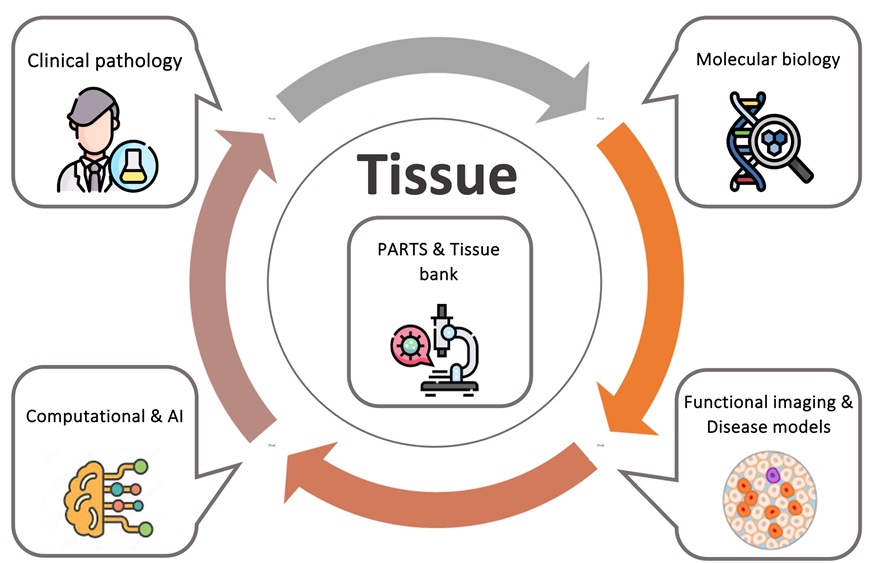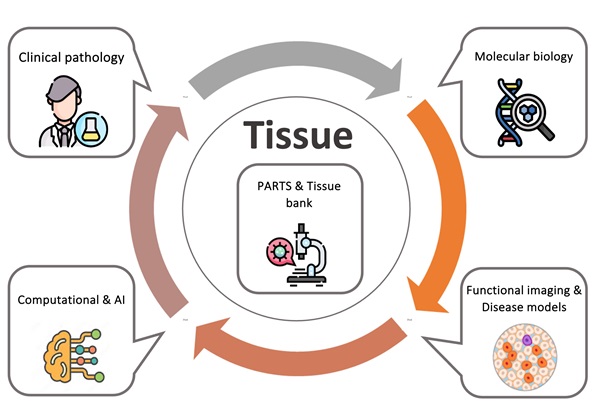About our Department
Our research
The research mission of the department of Pathology and Clinical Bioinformatics is to optimize clinical health care by tissue-based disease classification, patient risk stratification and therapeutic response prediction. The strategy is driven by five expertise clusters.

Our research team
Head of the Department
Prof.dr. F.J. (Folkert) van Kemenade
Deputy Head of Department
Full Professors:
Professor of Experimental Pathology
Prof.dr. A.B. (Adriaan) Houtsmuller
Professor of Functional Cell Anatomy
Prof.dr. G.J.L.H. (Arno) van Leenders
Professor of Urological Pathology
Prof.dr. P.J. (Peter) van der Spek
Professor of Clinical Bioinformatics
Prof.dr. T. (Tokameh) Mahmoudi
Professor Molecular Mechanisms in Disease
Prof.dr. E.J.M. (Ernst Jan) Speel
Head of Molecular Diagnostics
Associate Professors:
Dr. C.H.M. (Carolien) van Deurzen
Assistant Professors:
Dr. M.P.A. (Martijn) Starmans (shared Radiology)
Researchers:
Dr. R.J.T.S. (Robert Jan) Palstra
Dr. T.P.P (Thierry) van den Bosch
Pathologist Researchers:
Dr. M.C. (Marian) Clahsen-van Groningen
KMBP researchers:
Research Coordinator:
Research lines
The research mission of the department of Pathology and Clinical Bioinformatics is to optimize clinical health care by tissue-based disease classification, patient risk stratification and therapeutic response prediction.

Whereas strong mutual interactions obviously exist between clusters, key characteristics of the research lines within each cluster are as follows:

Six out of 15 clinical pathologists have established long-term research lines, in particular relating to breast, lung, neurological, ophthalmological and prostate cancer, as well as renal transplant rejection. The incentive of clinical pathology research is to directly affect patient health care by improving risk stratification, supporting clinical decision-making and predicting therapeutic response. Clinical pathology research is increasingly performed in regional scientific networks, aligning with current trends towards health care centralization and regionalization.

This cluster includes research lines of computational scientist PIs who are (a) focusing on tissue-slide based computational image analysis and AI to objectify and quantify microscopic features related to disease outcome in close collaboration with clinical pathologists. In addition, (b) this cluster is establishing robust bioinformatic pipelines for a variety of high-throughput molecular data sets together with molecular biologists of our department and Erasmus MC partners. Our PHANTOM (PatHology Artificial iNTelligence platfOrM) platform is closely collaborating with TU Delft amongst others within the Convergence “CanMicrobes” project and the “Organ Transplantation: making unsuitable donor organs suitable“ Flagship.

The department houses molecular-biological scientists with long-term research lines on (a) the cell of origin in colon carcinogenesis, tumor cell plasticity in development of metastasis, and (b) molecular mechanisms driving viral infection, latency and pathogenesis in patient-derived models. The research within this cluster is both fundamental in identifying targetable molecular players, and unravelling pathophysiological and molecular mechanisms for key events in tumorigenesis, progression, and viral infection, as well as translational to identify novel biomarkers for disease progression and therapeutic response.

This cluster is strongly linked to the Optical Imaging Centre (OIC) and is dedicated to applying highly specialized microscopic platforms such as super-resolution and light-sheet microscopy to analyze complex (sub)cellular cell processes in relevant disease models. In addition, research lines aim to establish state-of-the-art functional analysis of individualized in vitro and in vivo disease models for studying tumor angiogenesis and viral infections, as well as develop low and medium throughput patient-derived ex vivo platforms for drug screening including using image-based read-outs. Development of new imaging modalities is typically done in close collaboration with TU Delft within the Convergence Imaging Facility and Innovation Center (CIFIC) Flagship.

Apart from its specific research lines, the department participates in and facilitates over 200 Erasmus MC tissue-based research projects each year. The Pathology Research and Trial Service (PARTS) and Tissue bank have been specifically set up to share our highly specialized technical expertise and equipment and provide services according to ISO-accredited standards. PARTS also represents an infrastructure to acquire and implement new dedicated technical platforms to support both departmental and Erasmus MC research lines.

The clusters and research lines are characterized by the specific background expertise of individual PIs. Inherent to the pathology department is its high level of expertise among a wide range of oncological and non-oncological disease processes, which is reflected by research lines on several disease entities. Strong mutual scientific interest in specific research questions and disease models solidifies collaborations between the clusters and interdisciplinary research lines within the department. Much of the research focus areas require expert contribution from different clusters, which is a specific strength of the inclusive expertise within our department, an infrastructure, which will be further reinforced in the coming years. Apart from the intra-departmental interactions, research is typically performed within the framework of long-term collaborations with clinical departments as well as the other Diagnostics & Advice theme departments with shared PhDs and postdocs.

